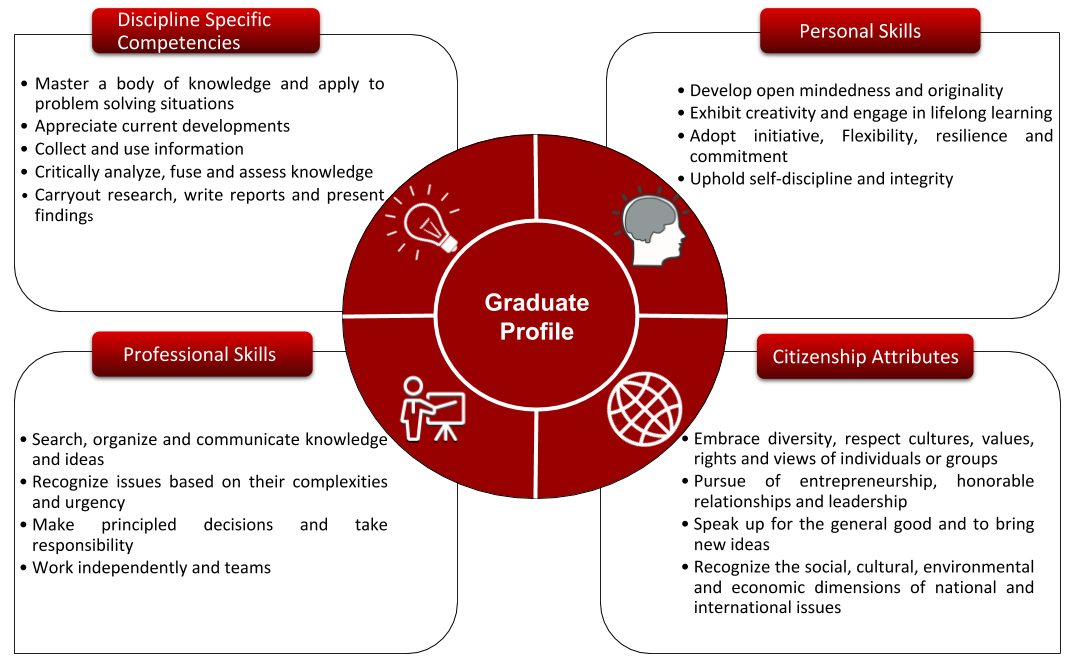Our Vision
The Vision of the faculty is to be recognised centre of science learning in Sri Lanka.
Our Mission
The Mission of the faculty is to produce competent graduates who excel in learning and research in basic sciences and who could contribute to the development of the nation.
Objectives:
- To attain an internationally recognisable level of teaching and research.
- To disseminate scientific knowledge and popularise science.
- To improve the quality of science education.
- To provide services directed towards the environmental, social and technological needs of the region.
- To be a regional research centre in science, developing indigenous scientific methods using local resources
- To improve the economic and social conditions of the local population
Graduate Profile:
The faculty aims to instil in its graduates the competencies in academic disciplines, personal and professional skills and citizenship attributes through its teaching, learning and research activities and enhancement of the advisory and support services, and cultural, social and sports-related extracurricular activities.
The FoS is dedicated to develop the learning and teaching environment with the current developments in science education and research so that the graduates shall meet the desire of the trends of the global science community. Ultimately, the BSc Honours degree holder from the university shall be a scholar with versatile skills to cater the needs of local communities and shall become a professional and global citizen.

Expected Programme Outcomes
The expected programme outcomes represent what a graduate is expected to know and/or be able to do after completing the study programme. In addition to the expected outcomes of the BSc degree programme, the BSc Honours graduates are expected to be with
- ability to systematically analyse the core ideas of the subject of specialization
- ability to construct new knowledge in the subject of specialization
- ability to find solutions to the problems with professional context
- ability to utilize the knowledge for personal development and in professional practice
- capacity to carry out research and effectively disseminate new knowledge and/or ideas
- ability to adapt, initiate change and construct ideas to lead the change to help the needy society with social responsibility and positive attitude
All these programme outcomes are achieved by adopting relevant teaching, learning, and assessment strategies in the study programmes.
Brief History
The Faculty of Science was set up in October 1974 at Vaddukoddai in the premises taken over from the Undergraduates’ Section of the Jaffna College. The first batch of students numbering 103 was admitted to the Faculty on 25th October 1974 and only a course in Mathematics and Statistics was provided initially. The late Professor P. Kanagasabapathy functioned as the first Dean of the Faculty and the Head of the Department of Mathematics and Statistics. After the appointment of Heads of Departments and a few Assistant Lecturers for some of the other disciplines in Science, courses in physical science and bioscience were started in 1975. Thirty-five students were admitted to these courses in the academic year 1975/76. As the facilities available in the small laboratories at Vaddukoddai were grossly inadequate for work beyond the First Year Courses and future development at Vaddukoddai was not possible due to acute shortage of freshwater and space, a decision was taken to put up new buildings for the Faculty of Science at Thirunelvely where the Faculty of Humanities and the administrative offices were sited.
The Faculty shifted to the Thirunelvely premises in June 1978 soon after the completion of the Natural Science Block (Stage I), the foundation for which was laid on 07 May 1975. In 1977, funds were voted for a building to the Department of Physics and this building came into the occupation in September 1980. Funds were also voted for two other buildings in 1979, one for the Department of Mathematics and Statistics and the other for the Department of Chemistry. The Mathematics block was completed in 1985. The Chemistry Block was completed in 1988. The Natural Science Block (Stage II) was opened for academic activities in 2013. The foundation for the building to the Department of Computer Science was laid on 27 June 2019 with the World Bank-funded AHEAD operations. The construction of the building is scheduled to be completed by March 2021.
The Faculty of Science consists of seven departments. The annual intake of students to the Faculty had increased over the years and it was about 250 in the mid-eighties. Since 2009, the Faculty is flourished with the intake of students from all parts of the Island representing all ethnicity which added a conducive multicultural environment in the Faculty to foster and promote social harmony. Under the President’s scholarship scheme, few international students are also admitted to the Faculty since 2016. The current student population at the Faculty is over 1200.
Former Deans of Our Faculty
| Name | From | To |
|---|---|---|
| Prof. P. Kanagasabapathy | 1974 | Jan 1977 |
| Prof. K. Kunaratnam | Jan 1977 | May 1978 |
| Prof. V. Tharmaratnam | Jun 1978 | Dec1984 |
| Prof. K. Kunaratnam | Jan1985 | Mar1988 |
| Prof. V. K. Ganeshalingam | Apr1988 | Feb1991 |
| Prof. S. Mageswaran | Mar1991 | Oct 1996 |
| Prof. V. K. Ganeshalingam | Nov 1996 | Nov 1999 |
| Prof. R. Kumaravadivel | Nov 1999 | Jul 2010 |
| Prof. K. Kandasamy | Jul 2010 | Jul 2013 |
| Prof. S. Srisatkunarajah | Jul 2013 | Jul 2016 |
| Prof. R. Vigneswaran | Jul 2016 | Apr 2017 |
| Prof. J. P. Jeyadevan | May 2017 | May 2020 |
